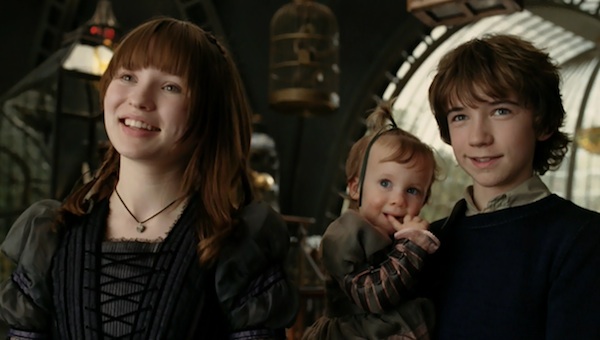Books For Jem and the Holograms’ Tour
For those who want to relive their love of Jem and the Holograms, the show about a group of foster sisters who are bequeathed a holographic projection system by their father, and then use it to become an internationally acclaimed rock and roll group (as you do), there’s no shortage of modern retellings. But before you dive headfirst into the wonderful IDW comic series, or the new film out October 23, let’s take a moment to discuss which books the original, truly outrageous, Jem and the Holograms would find time to read between all that glamour and glitter, fashion and fame.
Jem/Jerrica Benton

Rookie Yearbook One (Ed. Tavi Gevinson)
Wanting a break from her busy life as famous rock star Jem, and as the head of Starlight Music and the Starlight Foundation and foster home for girls (as Jerrica), Jem would absolutely have loved to kick back with a collection of essays, articles, stories, collages, and photo essays made for young women by young women. Jem’s girl power ethos is beautifully mirrored within its pages and you just know she would have left it in strategic locations in the Starlight mansion for the girls to find.
Twelfth Night (William Shakespeare)
When she wasn’t busy juggling her many roles, Jem struggled with her relationship with Rio, who loved Jerrica but was always distracted by the glamour of Jem. A comedy where people find love even while in disguise, and no one is hurt by the deception in the end seems like the perfect balm to soothe Jerrica’s insecurities.
Aja Leith

Harriet the Spy (Louise Fitzhugh)
You just know that observant, straight-talking, no-nonsense Aja loved this book growing up, and kept a battered old copy with her when she was on the road. Harriet may have been tactless and unclear on the concept of personal boundaries, but her spying came from an enthusiastic curiosity, and in the end she managed to put her skills to good use by heading up the school newspaper. Aja might have been making headlines rather than writing them, but her role as the voice of reason in the group make her Harriet’s kindred spirit.
I’ll Never Write My Memoirs (Grace Jones)
A musician, performer, and tomboy unafraid of showing her feminine side, it’s only natural that Aja would have greatly admired Grace Jones. Jones’s exuberance, creativity, and androgynous style are easy to fall in love with, and Aja would definitely have burned through her memoirs, both for pleasure and to pick up tips.
Shana Elmsford

Women in Clothes (Eds. Heidi Julavits, Leanne Shapton, Sheila Heti)
A sizeable volume full of essays on women, fashion, feminism, and the relationships we have with our clothes? That seems right up fashion designer Shana’s alley. Her interest in design might never distract her from the Holograms for long, but you just know Shana would have taken time to read some smart writing on a topic so close to her heart.
All About Love (bell hooks)
Shana was the Hologram with the most stable love life (dating hunky music producer Julian Alexander), and so would most likely have been the one secure enough to examine love and the many preconceived notions we have about it. All About Love explores affection, romance, commitment, and the gender stereotypes inherent in each, and creative Shana would have totally fallen for hooks’s beautiful prose.
Kimber Benton
Girl in a Band (Kim Gordon)
All little sister Kimber wanted was to write songs, play music, and have a good time. Her place in the Holograms meant a lot to her (though she sometimes felt unappreciated) and reading the memoirs of Sonic Youth bassist Kim Gordon would be just the thing she needed to continue to trust her instincts and push herself artistically.
Americanah (Chimamanda Ngozi Adichie)
A hopeless romantic, Kimber would benefit from a grown up love story to help her move past some of her previous rash decisions. (Remember when she decided to get married in a split second and just barely realized her mistake in time?) Adichie’s Americanah weaves a beautiful romance that spans decades and continents, dealing with family, immigration, and loss, and shows that a love story doesn’t need to be a perfect fairy tale to be meaningful.
Carmen “Raya” Alonso

Tom Tom magazine
A magazine about women and drumming? Raya’s probably been subscribed for years. Drumming was never just a hobby for Raya. It was her passion, her opportunity to follow her dreams and find her confidence. Drumming is something she fought for (quite literally, since she had to win a contest to become the Holograms’ newest member) and a quarterly dedicated to female drummers would have meant a lot to her (plus she probably was on the cover at some point).
Lilith’s Brood (Octavia E. Butler)
Before joining the Holograms, Raya was shy and ill at ease with herself and her talent. Needing her father’s encouragement to even try out, she definitely could have used Butler’s Lilith Iyapo as a role model. In the three-part science fiction series, Lilith must learn to deal, and live, with a mysterious and unsettling alien race called the Oankali. If Lilith could single-handedly save her species, then Raya definitely would be capable of giving it her all in a drumming competition.
The Misfits

Girls to the Front: The True Story of the Riot Grrrl Revolution (Sara Marcus)
As frustrating as the Misfits could be with their irrational anti-Jem campaign, they were undeniable badasses. Whereas the Holograms sang about kindness and generosity, the Misfits’ message was much more centered on making noise and demanding respect. What do you want to bet they would have embraced the Riot Grrrl movement a few years later?
The Prince (Niccolò Machiavelli)
That being said, the band’s empowering message was just a little tainted by their insatiable desire to ruin and humiliate the Holograms. Not only were they petty and cruel, their schemes were usually crude, overwrought, and doomed to fail from the start. If anyone needed Machiavelli’s lessons on manipulation and subterfuge, it was the Misfits.
The Stingers

Satanic Panic: Pop-Cultural Paranoia in the 1980s (Eds. Kier-La Janisse and Paul Corupe)
With front man Riot’s glam hair band aesthetic, and his bandmates’ more overt sexuality and interest in the occult, the Stingers were a conservative 80s parent’s worst nightmare. The band would probably have been very interested in a book that explores the panic that swept that decade, when everything from heavy metal to fantasy role-playing games were accused of seducing children into Satan worship.
The Captain’s Verses: Love Poems (Pablo Neruda)
If there’s one thing you can say about the Stingers, it’s that they certainly could put on a performance. Riot, Minx, and Rapture were dramatic, stylish, and no strangers to grand pronouncements and over-the-top (though not particularly sincere) displays of sentimentality. They would have just loved Neruda’s lyricism and passion, though perhaps without fully understanding it.
Show’s over, Synergy!




